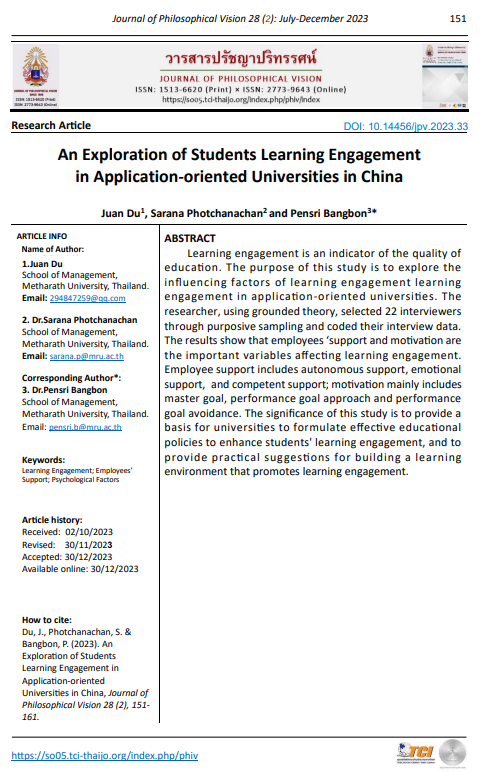An Exploration of Students Learning Engagement in Application-oriented Universities in China
คำสำคัญ:
Learning Engagement;, Employees' Support;, Psychological Factorsบทคัดย่อ
Learning engagement is an indicator of the quality of education. The purpose of this study is to explore the influencing factors of learning engagement learning engagement in application-oriented universities. The researcher, using grounded theory, selected 22 interviewers through purposive sampling and coded their interview data. The results show that employees ‘support and motivation are the important variables affecting learning engagement. Employee support includes autonomous support, emotional support and competent support; motivation mainly includes master goal, performance goal approach and performance goal avoidance. The significance of this study is to provide a basis for universities to formulate effective educational policies to enhance students' learning engagement, and to provide practical suggestions for building a learning environment that promotes learning engagement.
Downloads
เอกสารอ้างอิง
Alivernini, F., & Lucidi, F. (2011). Relationship between social context, self-efficacy, motivation, academic achievement, and intention to drop out of high school: A longitudinal study. The journal of educational research, 104(4), 241-252.
Bakker, A. B., & Demerouti, E. (2017). Job demands–resources theory: Taking stock and looking forward. Journal of occupational health psychology, 22(3), 273.–285.
Christenson, S., Reschly, A. L., & Wylie, C. (2012). Handbook of research on student engagement (Vol. 840). New York: Springer.
Di Domenico, S. I., & Ryan, R. M. (2017). The emerging neuroscience of intrinsic motivation: A new frontier in self-determination research. Frontiers in human neuroscience, 11, 145.
Diseth, Å., Danielsen, A. G., & Samdal, O. (2012). A path analysis of basic need support, selfefficacy, achievement goals, life satisfaction and academic achievement level among secondary school students. Educational Psychology, 32(3), 335-354.
Dixon, J. R., Xu, J., Dileep, V., Zhan, Y., Song, F., Le, V. T., ... & Yue, F. (2018). Integrative detection and analysis of structural variation in cancer genomes. Nature genetics, 50(10), 1388-1398.
Eccles, J. (2011). Gendered educational and occupational choices: Applying the Eccles et al. model of achievement-related choices. International Journal of Behavioral Development, 35(3), 195-201.
Elliot, A. J., & Murayama, K. (2008). On the measurement of achievement goals: Critique, illustration, and application. Journal of educational psychology, 100(3), 613.
Fredricks, J. A., Filsecker, M., & Lawson, M. A. (2016). Student engagement, context, and adjustment: Addressing definitional, measurement, and methodological issues. Learning and instruction, 43, 1-4.
Huang, C. (2012). Discriminant and criterion-related validity of achievement goals in predicting academic achievement: A meta-analysis. Journal of Educational Psychology, 104, 48–73.
Kallio,H.,Petaluma’s.,Johnson,M.,& Kangasniemi, M. (2016). Systematic methodological review: developing a framework for a qualitative semi‐structured interview guide. Journal of advanced nursing, 72(12), 2954-2965.
Kaplan, A.,&Maehr, M. L. (2007). The contributions and prospects of goalorientation theory. Educ. Psychol. Rev. 19, 141–184. doi: 10.1007/s10648-006-9012-5
Kuh, G. D. (2001). The National Survey of Student Engagement: Conceptual framework and overview of psychometric properties.
Lombardi, D., Sinatra, G. M., & Nussbaum, E. M. (2013). Plausibility reappraisals and shifts in middle school students' climate change conceptions. Learning and Instruction, 27, 50-62.
Reddy, R., Rhodes, J. E., & Mulhall, P. (2003). The influence of teacher support on student adjustment in the middle school years: A latent growth curve study. Development and psychopathology, 15(1), 119-138..
Ryan R. M., Deci E. L. Self-determination theory and the role of basicpsychological needs in personality and the organization of behavior. In RWRobbins and LA Pervin OP John, (ed.), Handbook of Personality: Theory and Research. New York: The Guilford Press, 2009.
Ryan,R.M.,&Deci,E.L.(2009). Promoting self-determined school engagement: Motivation, learning, and well-being.
Sakiz, G., Pape, S. J., & Hoy, A. W. (2012). Does perceived teacher affective support matter for middle school students in mathematics classrooms? Journal of school Psychology, 50(2), 235-255.
Vallerand, R. J., Fortier, M. S., & Guay, F. (1997). Self-determination and persistence in a reallife setting: toward a motivational model of high school dropout. Journal of Personality and Social psychology, 72(5), 1161. -1176.
Wigfield, A., Eccles, J. S., Fredricks, J. A., Simpkins, S., Roeser, R. W., & Schiefele, U. (2015). Development of achievement motivation and engagement.
Xu.D.D.,LV.L.H.,Fu,D.L.(2020). On the characteristics of high impact educational activities of Undergraduates in Chinese Research Universities. Higher education research, 41(02), 58-65.
Zhang,P.P.(2012). Evaluation of the effects of employee-based systems in China from the perspective of human resource management in public organizations, Journal of Liaoning Administrative College,14(8),24-29

ดาวน์โหลด
เผยแพร่แล้ว
รูปแบบการอ้างอิง
ฉบับ
ประเภทบทความ
สัญญาอนุญาต
ลิขสิทธิ์ (c) 2023 Journal of Philosophical Vision

อนุญาตภายใต้เงื่อนไข Creative Commons Attribution-NonCommercial-NoDerivatives 4.0 International License.
บทความวิชาการและบทความวิจัย ในวารสารฉบับนี้ ถือเป็นความรับผิดชอบของผู้เขียนเท่านั้น
สงวนลิขสิทธิ์ตามพระราชบัญญัติลิขสิทธิ์





